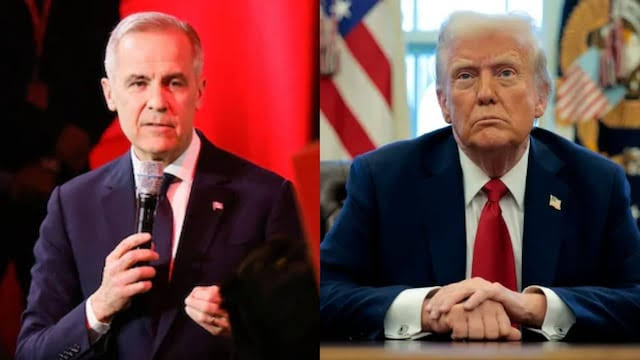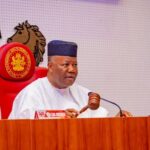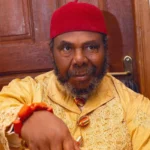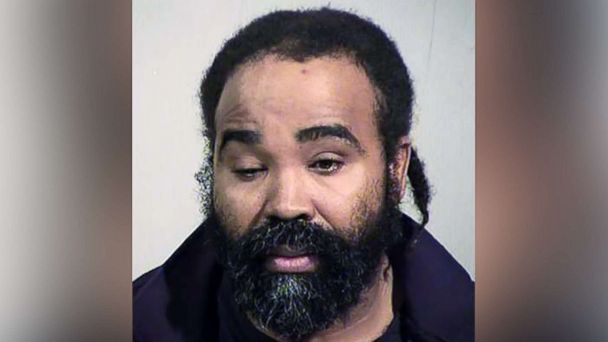Mark Carney has emerged as the new leader of Canada’s Liberal Party, setting the stage to become the next prime minister.

He takes the office at a challenging time, with tensions high between Canada and the United States over trade disputes initiated by President Donald Trump.
Mark Carney, a former head of both the Bank of Canada and the Bank of England, secured a decisive victory in the party’s leadership race, defeating three other candidates.
In his acceptance speech, Carney, 59, didn’t hold back in criticizing Trump, who has imposed tariffs on Canadian goods and even suggested making Canada the 51st US state.
“Americans should make no mistake. In trade, as in hockey, Canada will win,” Carney declared, vowing to win the trade war against Trump.
He is expected to be sworn in as prime minister soon and will lead the Liberals into the next general election, which could happen in the coming weeks.
Carney, who has never held elected office before, steps into the role after Justin Trudeau resigned earlier this year following nearly a decade in power.
Trudeau faced growing pressure to step down due to declining public support, driven by frustrations over a housing crisis and rising living costs.
Mark Carney won the leadership race with an overwhelming 85.9% of the vote, far ahead of his closest competitor, former Finance Minister Chrystia Freeland.
The announcement of his victory was met with loud cheers from about 1,600 party members gathered in Ottawa.
Over 150,000 people participated in the vote. Carney will lead a minority government, meaning he could call an early election or face a potential no-confidence vote from opposition parties later this month.
Since Trudeau’s departure, the Liberals have seen a surge in support, partly due to Canadians rallying against Trump’s aggressive trade policies and his comments about annexing Canada.
Earlier this year, the Liberals were trailing the Conservatives by more than 20 points in polls, but the gap has since narrowed, with some surveys now showing the two parties neck and neck.
Carney’s speech heavily criticized Trump’s tariffs on Canadian goods, calling them “unjustified.”
The U.S. recently imposed a 25% tariff on Canadian products but quickly rolled it back for items covered under an existing trade agreement.
Canada responded with its own tariffs, and Carney echoed Trudeau’s earlier accusations that Trump is trying to undermine Canada’s economy.
“Trump was attacking Canadian workers, families, and businesses. can’t let him succeed,” Carney said, vowing to maintain tariffs on U.S. imports until the U.S. shows Canada respect.
Canada’s economy relies heavily on trade with the U.S., and Carney warned that Trump’s tariffs could push the country into a recession.
He urged Canadians to unite and support one another during these difficult times.
Carney said, “I know these are dark days. Dark days brought on by a country we can no longer trust.
“We’re getting over the shock, but let us never forget the lessons: we have to look after ourselves and we have to look out for each other. We need to pull together in the tough days ahead.”
Carney also addressed Trump’s criticism of Canada’s border control, pledging to “secure our borders.”
He took aim at his main political rival, Conservative leader Pierre Poilievre, accusing him of being too close to Trump.
“Pierre Poilievre’s plan will leave us divided and ready to be conquered. Because a person who worships at the altar of Donald Trump will kneel before him, not stand up to him,” Carney said.
Before Carney’s speech, Trudeau delivered an emotional farewell, reflecting on his 12 years as Liberal leader.
He warned that Canada faces an “existential challenge” under Trump’s administration.
Meanwhile, the Conservatives have shifted their strategy since Trudeau’s resignation, attacking Carney as a continuation of Trudeau’s policies rather than a true change.
They’ve also accused Carney of misleading the public about his involvement in relocating the headquarters of investment firm Brookfield Asset Management from Toronto to New York.
Despite the criticism, Carney has garnered support from key figures like Federal Public Safety Minister David McGuinty, who praised his “quiet but steely determination” to tackle major issues. McGuinty expressed excitement for the future, saying, “It’s time for an election.”
Carney’s platform focuses on centrist policies, a shift from Trudeau’s left-leaning approach. He has promised to advance energy projects like pipelines, invest in housing and clean energy, and reduce trade barriers between Canadian provinces.
He also aims to diversify Canada’s economy to reduce reliance on the U.S. Additionally, Carney has pledged to limit the size of the federal government, which grew significantly under Trudeau.
In the upcoming election, the Liberals will face off against Poilievre’s Conservatives, the Bloc Quebecois, and the New Democrats. Carney’s leadership will be tested as he navigates these political challenges and works to unite Canadians during a period of uncertainty.
KanyiDaily recalls that China recently filed a formal complaint with the World Trade Organization (WTO) in response to the United States’ decision to impose an additional 10% tariff on Chinese goods.


![Reactions As Uche Montana Flaunts Her Lamborghini [Video] 2 Reactions As Uche Montana Flaunts Her Lamborghini [Video]](https://media.kanyidaily.com/2025/03/08172827/Uche-Montana-150x150.jpg)

![David Umahi Boasts Of Taking Woman's Land For Highway Project [Video] 5 David Umahi Boasts Of Taking Woman's Land For Highway Project [Video]](https://media.kanyidaily.com/2026/02/10162217/IMG_20260210_162135-150x150.jpg)



















